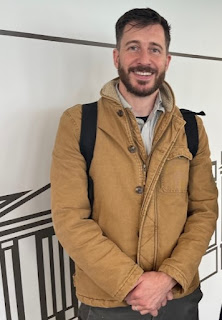"We make a lot of decisions about people's lives without involving people"
Some time ago, I came
across this amazing first-person piece in the Guardian, written by Robert White
about his experience leading homelessness at Westminster Council.
https://www.theguardian.com/commentisfree/2020/oct/31/solve-homelessness-westminster-system

I worked so far away in Melbourne but was struck by the similarities in our experience, the shared challenges - and frustrations.
I was really
fortunate to be introduced to Rob, who now works for a pretty amazing
rights-based organisation - Mayday
Trust - and is soon to move to Australia.
His commentary on the
experiences in being a local government homelessness worker had me nodding so much I felt dizzy. He also had some really
interesting ideas about ways forward, very much involving people who have, or
are still, experiencing homelessness.
Here are some key
points that I scribbled down when we chatted in London on 11 October.
RELATIONSHIPS,
RESPONSE AND INNOVATION
The role of the
local govt can become to manage the problem but not necessarily change things. Much
of the innovation taking place in the homelessness space is focused on system
tweaking - not changing the way we work with people.
Most local authority
funding is very transactional - services do what they are told and the big
homelessness organisations get a lot of money to do their work
It suited us because
they did what we asked and if something went wrong, they took the hit. It made
life easy, we never changed.
A paradigm shift from
command and control to doing what the people ask is a huge change but until we
move into a strengths-based culture we won't have a different outcome we will
always have poor people being poor and an undercurrent of homeless.”
REFECTIONS ON THE
ROLE OF COUNCIL OFFICER
Places like central
London see a huge amount of focus on homelessness. Homelessness is a hot topic
a with a lot of high-level focus, including elected officials and senior
management.
It is all about
optics - how things look.
The people employed
to respond to that never get a chance to sit and think about how it can be
different. They are just constantly working on the problems in front of them.
As a job description,
(the role of) homelessness manager looks good - you put things in place and
help people end homelessness. But what you find is that you are no longer
responsible to the homeless person… You are much more beholden to business and
the wealthy residents, who have the ear of the council and police.
Daytime outreach is faux. It adds to the mindset of enforcement. The concept of joint enforcement (services working with council and police) is wrought. You offer something to the people on the streets first and if they don't take it, you kick them out.
You dress it up as
trying to do your best.
SOME IDEAS FOR
CHANGE?
Council staff working
on homelessness are stretched to the limit. They cannot get all the work done
and do not have the time to think about doing things in a better way.
Fundamentally you
need two teams. A team that does the fire fighting and another that looks at
what you want to achieve and looks at longer term outcomes.
You have to move to a
locality-based mindset and decision making
- Look at genuine
individual viewpoints
- When we co-produce
a response for the community with the community, start with the question what
does a good life look like to you? If you are genuinely led by the person who
you want to help. That person is in control
- Look at how you
leverage community money - working with health and other services. Not separately. Move from individual budgets
and take whole community approach.
ROBERT'S TOP TIPS
- Move away from
defining homelessness as a problem - it's not
how do local authorities deal with homelessness, but how do they respond to the
issues of their residents. One of those issues might be that they don't have a
home to live in.
- Local authorities
need to be more person led and strengths based in their response to residents. And include anyone in their geographic
footprint.
- Stop putting
problems in boxes - separate teams
for homelessness, mental health, care leavers don't work. Why can't we have the
whole system looking at people who are facing tough times?
- Build relationships
with people and build trust. Talk openly about
what it is like to be homeless. The push towards co production is there but you
can only do it if you are prepared to listen to the answer. We need to be
careful of lived experience and not tokenising that. It becomes a tix box.





Comments
Post a Comment